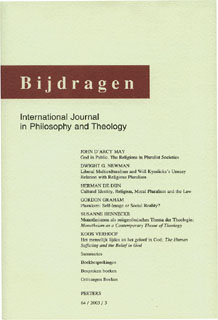next article in this issue  |

|
Document Details : Title: Über Schuld und Autonomie Subtitle: Plädoyer für den Aufbruch aus der Innerlichkeit Author(s): MERKS, Karl-Wilhelm Journal: Bijdragen Volume: 62 Issue: 3 Date: 2001 Pages: 247-279 DOI: 10.2143/BIJ.62.3.777 Abstract : The article deals with the relation between guilt and autonomy. It pleads for the widening of a concept of guilt which is only defined in relation to one’s good will and suggests to reintegrate the consequences of acts into the concept of guilt. Initially, autonomy appears to understand guilt as something solely interior. It all depends on “good will”, on “good conscience”. Catholic moral tradition, although mainly interested in questions of normativity, has itself contributed explicitly to this process of interiorization and “subjectivization” of guilt through its teachings on conscience. However, with the increase of individualism, the “objective” side of morality seems to disappear more and more from the awareness of guilt. Where the good will concentrates on the intention, the notion of the external reality of morality soon disappears. That the consequences of acts are also related to the good will, often remains underexposed. The article pleads for the opening up of such a concentration on the inward character of guilt, but not by leaving behind the concept of an autonomous morality. It is exactly through an autonomous morality that the objective dimensions of guilt can be given due attention. To this end, the author first summarises the content of his understanding of autonomous morality.Autonomy is not defined as the private competence or authority of decision, but as freedom and responsibility with regard to the good. The central issue is the responsibility of humans to assume the care for the proper use of freedom and power. Obviously, this responsibility includes next to the good intention also the exterior aspects of our doings. This insight is subsequently applied to the concept of guilt. First of all, the inward character of guilt is analysed and discussed. It is shown that guilt rightly has to be liberated from the identification with certain external criteria in order to bring its essential connection with conscience to the fore: guilt is not identical with illness, nor with the consequences of creaturely limitations of humanity and of the world, nor with the trespassing of norms or with an objective understanding of sin. Rather, sin has to be understood as a shortfall in the realisation of one’s own responsibility. However, this responsibility encompasses both the internal as well as the external, it contains both good will and the truly good. Such entwining also applies for guilt. This is mostly seen in the fact that guilt can itself be objectified into a common guilt and as a fate which in return provokes new guilt. This insight into the structure of guilt should lead to a consciousness of responsibility with regard to the foreseen consequences of our doings, as well as to the taking up of responsibility for the already present effects of our decisions. Such a kind of new reflection on the external side of our actions does not mean the end of “good conscience”, but wishes to articulate that conscience can only be qualified as “good” at the end. |
